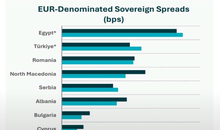
 Flash News
Flash News
Drenova prison police officer arrested for bringing drugs and illegal items into cell
Lavrov: NATO is risking self-destruction with new military budget
Kurti and Vučić "face off" tomorrow in Skopje
Construction worker dies after falling from scaffolding in Berat
The prosecution sends two Korça Municipality officials to trial
The government will protect the rights of the LGBTQ+ community with the Constitution, conservatives oppose

Hundreds of thousands of people protested in July in Berlin at the "Christopher Street Day" demonstration for the recognition of the rights of LGBTQ+ people. This abbreviation includes lesbians, homosexuals, "queer" people, but also those with other sexual identities, such as intersexuals, asexuals, people with double gender, bigender, or non-gender, who identify with a third gender.
Wanja Kiber is one of them, originally from Kazakhstan. He told DW his story: "We came to Germany and here I quickly revealed my sexual orientation. The parents' first reaction was to take sedatives, shut up, cry and not talk about it. What was this feeling, not telling anyone, not being yourself? Feeling like a criminal, pretending to be sick? Not to exist."
Christopher-Street-Day wants to change the constitutional law
But now my father is proud of me and commits to the rights of the LGBTQ+ community, continues Wanja Kiber. Wanja's story has a happy ending, but not everyone has the patience and luck of Wanja. Therefore, one of the main demands of Christopher-Street-Day was to include in the basic law the prohibition of discrimination due to sexual orientation. The basic law is the German constitution.
Herbert Grönemeyer, the famous German pop singer, said in his speech at the LGBTQ+ demonstration, that the basic law should be supplemented with the appendix: "no one should be discriminated against because of their gender and sexual identity." For this, patience and courage are needed, the singer appealed to the people.
Constitutional change with a two-thirds majority
Until now, Article 3 of the constitution states that "no one should be discriminated against or favored because of gender, origin, race, language, homeland and origin, religious belief, religious or political views". The problem is that a two-thirds majority is required in both the Bundestag and the Bundesrat, the representative body of the states, to change the Basic Law. However, Germany's three governing parties do not together hold two-thirds of the seats in parliament.
They need the approval of the largest opposition parties, the conservative CDU and CSU. But these two parties do not approve of this, as they consider the mention of gender in the current Article 3 to be sufficient. And above all, they want to prevent the expression "sexual identity" there. Quite a few observers think that the conservatives do not want to impose this term on their more conservative electorate.
Thorsten Frei, the executive leader of the Bundestag parliamentary group, told the editorial network, "Germany", that "very special reasons are needed to change the basic law, that is, the heart of the constitution. But I don't see any reason for changing the basic law, because the protection against sexual orientation discrimination is elaborated in the meantime in article 2 of the constitution."
The social democratic politician Dirk Wiese counters: "Unfortunately, the CDU/CSU parliamentary group has rejected talks on this. Therefore, it is to be welcomed that some CDU politicians in the states take a different position." It is about the Berlin politician, the mayor of the German capital, Kai Wegner, CDU. The state government, the Berlin Senate started in 2023 an initiative to change Article 3 of the constitution. Even conservative politician Wegner said a year ago that "we want to change Article 3 of the Basic Law. Sexual identity should be entered there. That is my promise.” But so far this promise has not been fulfilled.
After the rejection by the CDU, some representatives from the coalition said that changing the basic law would be a signal for acceptance in society. The liberal deputy, Konstantin Kuhl, FDP said for the German editorial network that "this would be an important signal for acceptability in society and politics. Changing the constitution at this point is even overdue."
Homosexuals in Germany were discriminated against until 1994
The Association of Lesbians and Homosexuals in Germany (LSVD) recalls that such a change would put an end to discrimination against homosexuals and bisexuals in post-war Germany.
When the Basic Law was established in 1949, homosexuals and bisexuals as victims of National Socialism were not included there. For this reason too, homosexuals were persecuted for many years after, based on paragraph 175 of the penal code, which was repealed in 1994.
There have been many improvements in the world regarding the rights of the LGBTQ+ community. But not everywhere. in Europe, marriage for all is approved in 22 countries, outside Europe in 16 countries.
In Germany, same-sex marriages can take place since October 1, 2017, after a heated debate of several years. By itself, in 20 countries in the world there are laws of self-determination of gender recognition. But the reality is that in a quarter of the countries in the world, the rights of LGBTQ+ people are discriminated against by law./dw
Latest news



Second hearing on the protected areas law, Zhupa: Unconstitutional and dangerous
2025-06-30 22:18:46



Israel-Iran conflict, Bushati: Albanians should be concerned
2025-06-30 21:32:42

Fuga: Journalism in Albania today in severe crisis
2025-06-30 21:07:11
"There is no room for panic"/ Moore: Serbia does not dare to attack Kosovo!
2025-06-30 20:49:53

Temperatures above 40 degrees, France closes nuclear plants and schools
2025-06-30 20:28:42
Lavrov: NATO is risking self-destruction with new military budget
2025-06-30 20:13:54
Turkey against the "Bektashi state" in Albania: Give up this idea!
2025-06-30 20:03:24

Accused of sexual abuse, producer Diddy awaits court decision
2025-06-30 19:40:44



Kurti and Vučić "face off" tomorrow in Skopje
2025-06-30 18:44:12
Tourism: new season, old problems
2025-06-30 18:27:23


Construction worker dies after falling from scaffolding in Berat
2025-06-30 17:51:44




Almost free housing: East Germany against depopulation
2025-06-30 16:43:06

Hamas says nearly 60 people killed in Gaza as Trump calls for ceasefire
2025-06-30 16:14:15
Drownings on beaches/ Expert Softa: Negligence and incompetence by institutions!
2025-06-30 16:00:03


European ports are overloaded due to Trump tariffs
2025-06-30 15:30:44
The prosecution sends two Korça Municipality officials to trial
2025-06-30 15:19:54

Lezha/ Police impose 3165 administrative measures, handcuff 19 drivers
2025-06-30 14:55:04
Young people leave Albania in search of a more sustainable future
2025-06-30 14:47:52
Record-breaking summer, health threats and preventive measures
2025-06-30 14:36:19


Constitution of the Parliament, Osmani invites political leaders to a meeting
2025-06-30 14:07:54

Heat wave 'invades' Europe, Spain records temperatures up to 46 degrees Celsius
2025-06-30 13:42:02
Accident in Vlora, car hits 2 tourists
2025-06-30 13:32:16

Kurti confirms participation in today's official dinner in Skopje
2025-06-30 13:03:27

Fight between 4 minors in Kosovo, one of them injured with a knife
2025-06-30 12:38:45

Report: Teenage girls the loneliest in the world
2025-06-30 12:20:40
Commissioner Kos and Balkan leaders meet in Skopje on Growth Plan
2025-06-30 12:07:59
Wanted by Italy, member of a criminal organization captured in Fier
2025-06-30 11:55:53
Hundreds of families displaced by wave of Israeli airstrikes in Gaza
2025-06-30 11:45:17

Zenel Beshi: The criminal who even 50 convictions won't move from Britain
2025-06-30 11:23:19
A new variant of Covid will circulate during the summer, here are the symptoms
2025-06-30 11:14:58


"Partizani" case, trial postponed to July 21 at the Special Court
2025-06-30 10:41:05
Uncontrolled desire to steal, what is kleptomania, why is it caused
2025-06-30 10:30:08
Requested change of security measure, hearing for Malltez postponed to July 7
2025-06-30 10:24:32


Output per working hour in Albania 35% lower than the regional average
2025-06-30 09:54:35


The trial for the "Partizani" file begins today
2025-06-30 09:27:57
22 fires in the last 24 hours in the country, 2 still active
2025-06-30 09:21:28
How is the media controlled? The 'Rama' case and government propaganda
2025-06-30 09:13:36
German top diplomat: Putin wants Ukraine to capitulate
2025-06-30 09:00:07
Foreign exchange, how much foreign currencies are sold and bought today
2025-06-30 08:44:38
Chart/ Sovereign risk for Albania from international markets drops significantly
2025-06-30 08:26:38
Horoscope, what do the stars have in store for you?
2025-06-30 08:11:44
Clear weather and passing clouds, here is the forecast for this Monday
2025-06-30 07:59:32
Morning Post/ In 2 lines: What mattered yesterday in Albania
2025-06-30 07:47:37
Milan make official two departures in attack
2025-06-29 21:57:23
6 record tone
2025-06-29 21:30:46
4-year-old girl falls from balcony in Lezha, urgently taken to Trauma
2025-06-29 21:09:58


Assets worth 12 million euros seized from cocaine trafficking organization
2025-06-29 19:39:43
Fire in Durrës, Blushi: The state exists only on paper
2025-06-29 19:17:48

Fire endangers homes in Vlora, helicopter intervention begins
2025-06-29 18:27:51
France implements smoking ban on beaches and parks
2025-06-29 18:02:08
England U-21 beat Germany to become European champions
2025-06-29 17:42:49
Trump criticizes Israeli prosecutors over Netanyahu's corruption trial
2025-06-29 17:08:10
Street market in Durrës engulfed in flames
2025-06-29 16:52:57

UN nuclear chief: Iran could resume uranium enrichment within months
2025-06-29 16:03:24
Albanian man dies after falling from cliff while climbing mountain in Italy
2025-06-29 15:52:01

Another accident with a single-track vehicle in Tirana, a car hits a 17-year-old
2025-06-29 15:07:15
While bathing in the sea, a vacationer in Durrës dies
2025-06-29 14:54:01
Sentenced to life imprisonment, cell phone found in Laert Haxhiu's cell
2025-06-29 14:26:40
77 people detained in protest, Vučić warns of new arrests
2025-06-29 14:07:46

